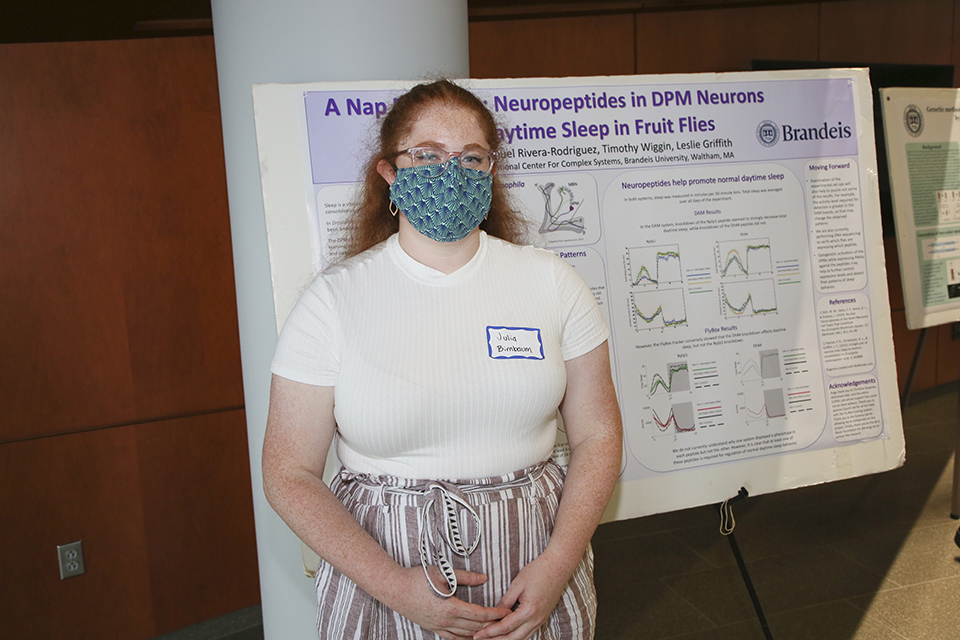Julia Birnbaum
M.R. Bauer Foundation Summer Science Research Fellow
Griffith Lab, Department of Biology
Brandeis University

A nap molecule: Neuropeptides in DPM neurons mediate normal daytime sleep in fruit flies
Sleep is vital for maintenance of homeostatic processes across species, from strengthening the immune system to solidifying memories. In Drosophila melanogaster, two neurons known as the Dorsal Paired Medial (DPM) neurons have been shown to promote sleep by inhibiting activity in the Mushroom Body, a major learning center in the fruit fly brain, but the ways in which the DPMs do this is not well understood. Neuropeptides are hormone-like proteins that have long been implicated in DPM pathways, though little is known about their function. I hypothesize that two of the most abundant neuropeptides in the DPMs, Dh44 and Nplp1, play a role in regulating sleep behavior.
Using the Gal4 > UAS system, we expressed RNA interference against these neuropeptides in order to investigate a sleep role in sleep behavior. Using the DAM system, we found that when Nplp1 was knocked down daytime sleep decreased while knockdown of Dh44 had no effect. Conversely, using the FlyBox tracking system, we found that Dh44 knockdown decreased daytime sleep with no effect in the Nplp1 knockdown. Further examination of experimental set ups and peptide sequences could show why different methods of examining sleep behavior elicit different results from each neuropeptide.
Personal Statement and Pandemic Reflection
The irony of my journey into research is rarely lost on me. The spring semester of my first year at Brandeis, I had the opportunity to do a six week rotation in the Griffith lab examining classical conditioning in Drosophila. There was just one problem: I am terrified of flies. I have thoroughly hated them for as long as I can remember. My younger sister still makes fun of me for hiding under the blankets, begging her to kill a fly that had rudely invaded my bedroom. So, while I was looking forward to the opportunity to gain new lab experience, my excitement was tempered by intense apprehension of having to face a big, if somewhat trivial, fear. Gradually, I grew to understand just how fascinating flies can be, from studying the effects of growth environments on egg-laying preferences to how losing a fight might change future decision making. They are a fantastic model for understanding a wide breadth of genetic tools and scientific methods.
When the pandemic began, I had just started working on an exciting new project which I was unfortunately not able to continue. Even when I returned to campus, restrictions made it difficult to work in the lab, and it was difficult to find time to conduct experiments and learn more lab procedures. With vaccines on the horizon, my hope was that over the summer I would be able to dedicate the time I had been unable to during the year to my research. With the help of the Bauer fellowship, I have been able to work on multiple projects investigating sleep and memory consolidation pathways. I have also been able to collaborate with more members of the lab and gain a broader and richer learning experience, which I am extremely grateful for. This summer has been incredibly beneficial not only for becoming more confident in the lab, but furthering my research and contributions as well as my connections with other incredible scientists.